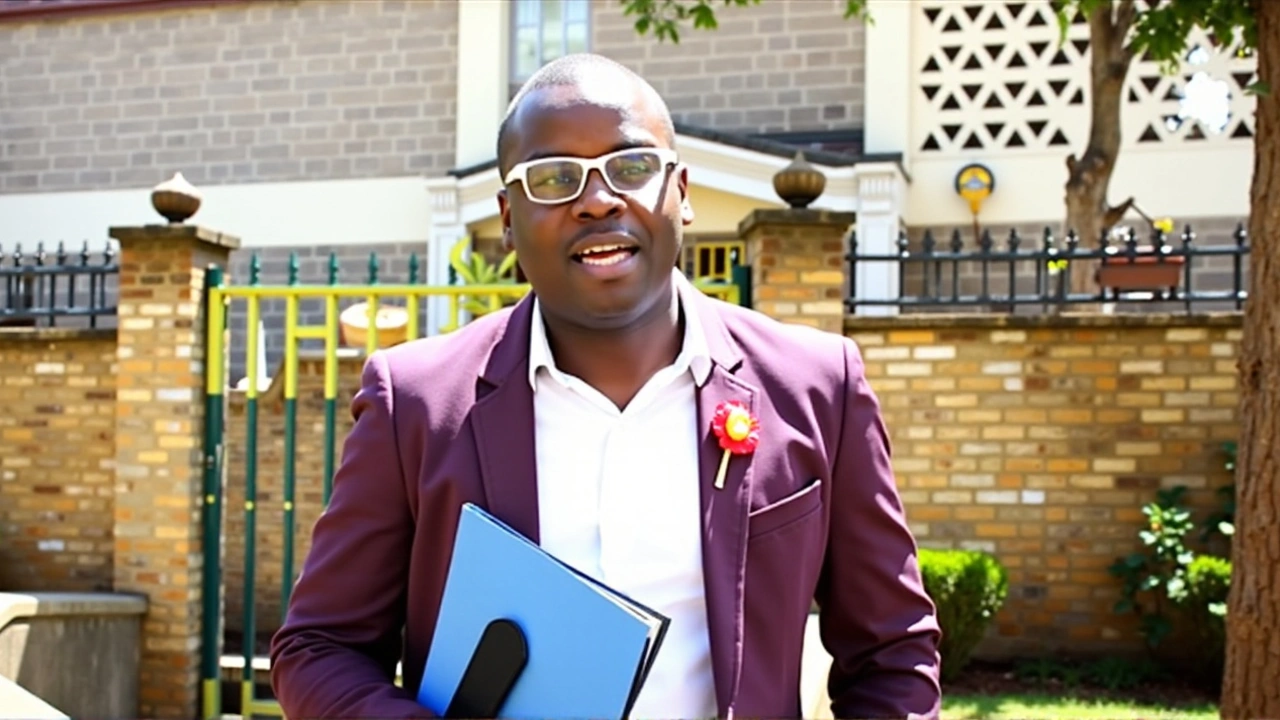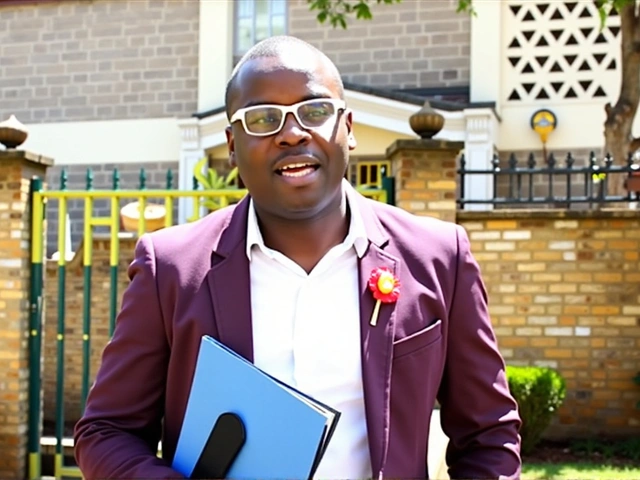Youth Leader Files Petition to Block Gachagua Impeachment Motion
In a dramatic turn of events, Denis Ndereva, a notable youth leader from Laikipia and the CEO of Youth for Youth Africa, has taken a bold step to prevent the impeachment of Kenya’s Deputy President, Rigathi Gachagua. Filing a petition in the Nyahururu High Court, Ndereva seeks to stop both the introduction and debate of the impeachment motion within the National Assembly and Senate until the culmination of Gachagua’s current term.
Ndereva's petition lists the National Assembly as the primary respondent, with Speaker Moses Wetangula, Senate Speaker Amason Kingi, and the Attorney General named as secondary respondents. Central to his argument is the claim that the impeachment process is loaded with political annotations rather than following the lawful constitutional pathway. This motion, which he insists is marred by procedural flaws, not only threatens the dignity of the office but inflicts irreparable harm, breaching the very essence of the Kenyan constitution.
Legality and Constitutional Questions
The petitioner presents an array of constitutional questions for the court’s consideration. First, he contests whether the impeachment meets the constitutional requirements as delineated in Article 150 of the Kenyan Constitution of 2010. This specific article sets the strict parameters under which a Deputy President can be impeached, ensuring the bar is set high to maintain the decorum and stability of the executive branches.
Ndereva’s petition also questions the adherence to constitutional principles such as fairness, natural justice, and due process. He raises concerns over the procedural integrity of the motion itself, suggesting that the drive behind the impeachment is politically contaminated and geared more towards rivalry than genuine accountability. The petitioner underscores the potential for the entire process to undermine public trust in democratic institutions, considering the risk it presents to a balanced separation of powers as enshrined in the Kenyan Constitution.
Judicial Determination and Potential Implications
Ndereva requests the High Court to grant an injunction against the National Assembly and Senate from conducting any discussions surrounding the impeachment motion. Furthermore, he wants the court to consider issuing a permanent injunction to forestall any future attempts at impeaching the Deputy President, asserting that such measures are vital to protect the sanctity of the office and support political stability.
The motivations behind the impeachment, he argues, fail to adhere to the stringent constitutional prerequisites, noting that the current framing of the motion lacks a clear legal basis and is steeped in political enmity. This, he claims, is a violation of the principles of natural justice and fairness, placing the Deputy President at the mercy of public trials rather than allowing due legal processes to determine his fate.
By framing his arguments under a certificate of urgency, Ndereva emphasizes the imminent risk posed by the motion if allowed to proceed without judicial scrutiny. He appeals to the court to take into account the broader implications—not just for Gachagua, but for the constitutional integrity of Kenya’s political system.
The Broader Impact on Kenya’s Political Landscape
The court's decision will be closely watched by political analysts and the public alike. At its core, this case covers fundamental constitutional doctrines such as the separation of powers, procedural due process, and the application of natural justice. The outcome will have far-reaching implications for the political framework and could set significant precedents on how future impeachment processes are managed in Kenya.
Ndereva's assertion that the impeachment motion is driven by political strife rather than justifiable legal grounds resonates with a history of politically motivated challenges within African democracies. The stability and fairness of executive procedures are paramount, and this petition seeks to fortify these principles against populist tendencies and political expediency.
It remains to be seen how the Nyahururu High Court will adjudicate on the varied legal and constitutional queries posed by the petitioner. A ruling in Ndereva's favor could potentially set a robust legal barrier against hasty and improperly founded impeachment motions, thus safeguarding the political office holders from undue political interference. Conversely, if the petition is dismissed, it might embolden politically motivated legal actions against key office bearers, thus reshaping the political landscape with an overt tone of rivalry and instability.
The unfolding of this high-stakes legal battle highlights the vulnerabilities and strengths of Kenya's constitutional mechanisms. The balance sought between maintaining executive accountability while deterring politically influenced legal pursuits to unseat statutory office bearers will inflame both public discourse and juridical interpretation in the days to follow.
As Kenyan citizens and political stakeholders anticipate the court's verdict, the case underscores the critical role of judiciary in upholding democratic principles. It also serves as a reminder of the intricate relationship between law and politics, particularly in a landscape where the former is often used as a tool by the latter.



Comments
Oh great, another legal circus to save a political heavyweight.
Honestly, this whole petition is a raw display of political clout‑watching. It’s clear that the youth leader wants to protect the status quo, but the way he frames it sounds like a desperate attempt to silence dissent. The constitution should be the ultimate arbiter, not a shield for any office holder. While some might applaud the move, it also sets a dangerous precedent for bypassing accountability. In short, it’s a power play masquerading as legal prudence.
From a constitutional perspective, any impeachment must strictly adhere to Article 150, which sets a high threshold to ensure stability. The petition raises legitimate concerns about due process and natural justice that deserve careful judicial scrutiny. It is essential that the High Court evaluates whether the motion meets the procedural requirements before proceeding. This approach protects both the office’s dignity and the rule of law. Ultimately, a balanced decision will reinforce democratic norms while preserving accountability.
Let’s unpack the layers of this legal maneuver.
First, the petition’s reliance on a “certificate of urgency” signals an attempt to fast‑track a politically charged issue, which can undermine thorough deliberation.
Second, the argument that the impeachment is merely political rather than constitutional disregards the fact that politics is inseparable from law in a democratic system.
Third, by seeking an injunction against both chambers, the petitioner effectively tries to freeze legislative debate, a power traditionally reserved for the judiciary only in exceptional circumstances.
Fourth, the claim of procedural flaws must be substantiated by concrete evidence, not rhetorical assertions.
Fifth, if the court grants a permanent injunction, it could set a precedent that stifles future legitimate impeachment inquiries.
Sixth, the separation of powers doctrine demands that each branch respect its own domain while providing checks and balances.
Seventh, the deputy president’s conduct and the legitimacy of the allegations against him remain unexamined in this filing.
Eighth, public confidence in the political process may erode if either side is perceived to manipulate legal tools for partisan ends.
Ninth, the constitutional courts have previously emphasized that impeachment is a political remedy with legal safeguards, not a mere procedural formality.
Tenth, the High Court must weigh the immediate risks against long‑term institutional integrity.
Eleventh, any decision should be transparent, providing a clear rationale that can be reviewed on appeal.
Twelfth, the Kenyan legal tradition values both stability and accountability, and this tension must be navigated thoughtfully.
Thirteenth, civil society’s role in monitoring the process is crucial for democratic legitimacy.
Fourteenth, the outcome will reverberate beyond Kenya, influencing how other African democracies manage executive challenges.
Fifteenth, regardless of the ruling, the political actors involved must commit to upholding constitutional norms rather than exploiting them for short‑term gain.
Wow, what a bold move! 🙌 This could really shape Kenya's political future. 🤞 Let's hope the court takes a fair look at the constitutional details. 🌍 Stay hopeful, folks! 😊
The procedural intricacies outlined in the petition underscore a critical nexus between statutory interpretation and political jurisprudence. By invoking the urgency certificate, the petitioner strategically leverages procedural expediency, yet this raises concerns about the potential erosion of deliberative safeguards embedded within the bicameral legislative framework. Moreover, the reliance on natural justice principles, while commendable, necessitates an evidentiary baseline that distinguishes substantive grievances from mere partisan maneuvering. In the context of constitutional law, the High Court's adjudicative function must reconcile the operative statutes of Article 150 with the overarching doctrine of separation of powers, ensuring that neither branch encroaches upon the legitimate domain of the other. This delicate balance, if mishandled, could precipitate a jurisprudential ripple effect, recalibrating the equilibrium that undergirds Kenya's democratic architecture.
It is deeply troubling when legal mechanisms are weaponized to shield public officials from accountability. The principles of justice demand transparency and fairness, not selective protection. Every citizen deserves a system that upholds integrity without fear or favor.
I see where you're coming from, and I respect the concern for due process. At the same time, we shouldn't forget that political stability is also vital. 🤝 Let's aim for a solution that respects both constitutional norms and the public's trust. 🌟
Interesting take on the petition it definitely raises questions about the balance of power and the role of courts in political disputes
Indeed, the timing of the filing, the choice of a high‑court venue, and the invocation of a “certificate of urgency,” all suggest a strategic layering of legal tactics, which, while perhaps procedurally sound, also risk blurring the lines between legitimate constitutional oversight and partisan interference, thereby necessitating a meticulous judicial review that weighs both the letter and spirit of the law, especially in a vibrant democracy that thrives on both stability and accountability.
This petition tests the limits of constitutional safeguards and could set a powerful precedent.
From a nationalist standpoint, protecting our leadership from frivolous legal attacks is essential for maintaining national cohesion; however, any action must be grounded in solid constitutional provisions, not mere political expediency.
Yo, this is huge! If they block the impeachment, it could change the whole game for Kenyan politics. Let's see how the court handles it.
Honestly, whatever the outcome, it’s a reminder that legal tools can be both protective and problematic. We should stay vigilant and hope for fairness.